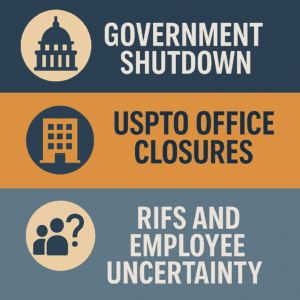Shuttering Patent Office Doors: USPTO Office Closures, RIFs, and a Government Shutdown That Isn’t One
 The U.S. Patent and Trademark Office (USPTO) is largely protected from the government shutdown but is not immune from other plans that have been brewing for a long time. In my circle, there has been a lot of talk about USPTO updates that may sound alarming: the federal government shutdown, the permanent closure of its Denver regional office, and notices of reduction in force (RIF) sent to employees. Here I break down what’s actually happening – and what isn’t.
The U.S. Patent and Trademark Office (USPTO) is largely protected from the government shutdown but is not immune from other plans that have been brewing for a long time. In my circle, there has been a lot of talk about USPTO updates that may sound alarming: the federal government shutdown, the permanent closure of its Denver regional office, and notices of reduction in force (RIF) sent to employees. Here I break down what’s actually happening – and what isn’t.
Limited Effect of Government Shutdown on USPTO Operations
Unlike most federal agencies, the USPTO is largely self-funded through the fees it collects from patent and trademark applicants. That financial independence cushions it against the immediate impacts of a government shutdown. While other agencies may shutter or furlough staff, the USPTO has historically remained open using its reserve operating funds. Current reports confirm the same pattern: applications can still be filed, office actions will still be issued, and deadlines remain in force. For inventors, businesses, and attorneys, the shutdown is somewhat of a non-event — at least for now. If a shutdown drags on for many months, reserves could run thin, but that is not the short-term expectation. In my fifteen plus years of practice, the Patent Office has never closed despite many government shutdowns.
Closure of the Rocky Mountain Regional Outreach Office
More consequential for the western innovation community is the USPTO’s decision to permanently close its Denver office. Opened in 2014 under the America Invents Act, the Rocky Mountain Regional Office was intended to bring patent and trademark expertise closer to inventors, startups, and universities in a nine-state area (though not Arizona). The USPTO’s announcement cites high costs and limited onsite staffing as justification; fewer than ten employees apparently worked in person at the Denver facility, while most examiners and judges telework. According to the agency, modern remote tools and virtual outreach make the physical office “less necessary.” Critics, however, warn that the closure reduces visibility and accessibility for local innovators and weakens the pipeline between law schools, regional businesses, and the patent system. We had forewarning of the foreclosure several months ago when the head of the office quit and no replacement was installed.
Reduction in Force and Employee Uncertainty
Layered onto this backdrop is news that the USPTO has issued reduction in force or RIF notices tied to shutdown preparations. These notices add to general employee unease. The agency has thousands of patent examiners and staff nationwide, many if not most of whom now work remotely. The layoffs are advertised as being directed to help the agency “focus on mission-critical operations” and apparently did not include patent or trademark examiners. Nonetheless, even if greater or broader layoffs prove unlikely, the messaging underscores broader questions about workforce stability and the USPTO’s future structure. For practitioners, the takeaway is less about immediate disruption and more about the shifting institutional landscape in which patents and trademarks are examined and litigated. There are rumors that the USPTO will eventually be brought under NIST.
Looking Ahead
For clients and practitioners, the message is twofold. First, the “government shutdown” does not mean that USPTO deadlines vanish – your filings and responses remain due. Second, watch the structural shifts closely. The Denver closure may be a one-off cost-saving measure, or it may foreshadow a broader retreat from regional offices and greater evolution of the USPTO and where it fits within governmental structure. Either way, the agency’s balance between cost efficiency, accessibility, and talent retention is in flux.
